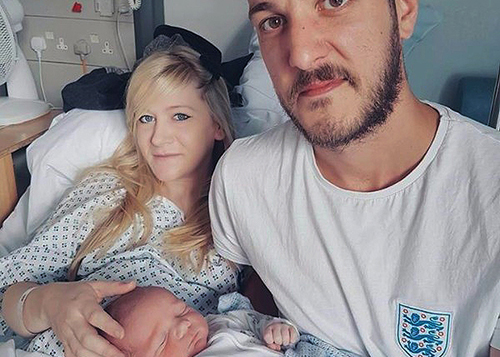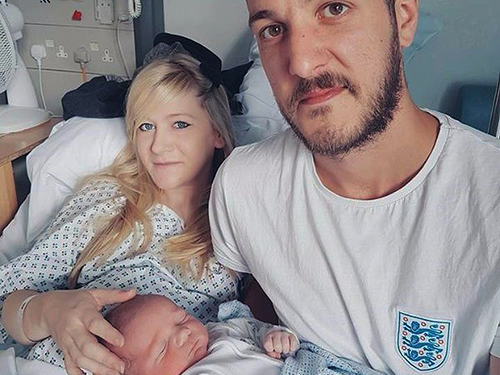
The situation of terminally ill British child Charlie Gard has made headlines around the world. DANICA KIRKA and NICOLE WINFIELD, in an article which comes via Religion News Service, explain what the case is all about…
RNS/AP
A terminally ill British child has attracted the attention of both the President of the United States and the Pope. More than £1.3 million ($US1.68 million) has been raised to help 11-month-old Charlie Gard travel to America for treatment.
But little has changed for baby Charlie, who suffers from a rare genetic disease that has left him brain-damaged and unable to breathe unaided. The life support he is receiving at a London hospital will soon be turned off over the objections of his parents, who want to take him to the United States for experimental therapy they believe could prolong his life.

This is an undated handout photo of Chris Gard and Connie Yates with their son, Charlie Gard, provided by the family, at Great Ormond Street Hospital in London. The president of the United States has offered to help. The pope is willing to have the Vatican hospital take the baby in. Some £1.3 million ($US1.68 million) has been raised to help him leave Britain for treatment. But as of 4th July, 2017, little had changed for Charlie, a terminally ill British infant suffering from a rare genetic disease that has left him severely brain-damaged. PICTURE: Family of Charlie Gard via AP
“The world is watching. Two of the most powerful men in the world want to give Charlie Gard his chance.”
– Statements on charliesfight.org, the website dedicated to Charlie’s cause.
A succession of judges has backed specialists at Great Ormond Street Hospital who say the treatment won’t help Charlie and may cause him to suffer. Britain’s Supreme Court ruled it’s in the boy’s best interests to be allowed to die with dignity. The European Court of Human Rights last week rejected an appeal from Charlie’s parents, Chris Gard and Connie Yates, exhausting their legal options.
They have been spending time with Charlie before he is taken off life support.
By wading into the case in recent days, President Trump and Pope Francis have given Mr Gard and Ms Yates new hope and shined an international spotlight on an ethical debate that pits the rights of parents to decide what’s best for their children against the authorities with responsibility for ensuring that people who can’t speak for themselves receive the most appropriate care.
“The world is watching,” reads the headline across the top of charliesfight.org, the website dedicated to Charlie’s cause. “Two of the most powerful men in the world want to give Charlie Gard his chance.”
Great Ormond Street Hospital said on Tuesday there were no new updates in Charlie’s care.
Trump tweeted Monday that he would be “delighted” to help Charlie, who is suffering from mitochondrial depletion syndrome, which causes progressive muscle weakness. The president’s comment came after Pope Francis issued a statement saying the parents’ rights to treat their son “until the end” should be respected.
The Vatican children’s hospital studied whether it was possible for Great Ormond Street to transfer Charlie to Rome. But Bambino Gesu hospital President Mariella Enoc said she was informed that the board of the London hospital said Charlie cannot be moved for legal reasons.
However, the matter was still being examined Tuesday.
“I was contacted by the mother, who is a very determined and decisive person and doesn’t want to be stopped by anything,” Enoc told reporters.
Vatican Secretary of State Cardinal Pietro Parolin has said the Holy See will do everything it can to overcome legal obstacles to bringing Charlie to Bambino Gesu for treatment.
“Overcome these problems? If we can do it, we will do it,” Cardinal Parolin said.
The fight over keeping Charlie alive is not about money. Charlie’s parents have used a crowdfunding website to raise the money needed to pay for his treatment in the US Instead, it revolves around an ethical debate about what’s best for the child.
Under British law, it is normal for courts to intervene when parents and doctors disagree on the treatment of a child – such as cases where a parent’s religious beliefs prohibit blood transfusions.
The rights of the child take primacy, rather than the rights of parents to make the call. It is a principle that applies even in cases where parents have an alternative point of view, according to Britain’s Court of Appeal.
And Britain’s courts have been consistent in this case. Three courts agreed that the experimental treatment would be futile and may “well cause pain, suffering and distress to Charlie.” The parents then took their case to the European Court of Human Rights, which refused to intervene and endorsed the British judges’ decision.
“It’s this terrible, terrible situation. It’s a horrible thing to have to decide.”
– Claire Fenton-Glynn, an academic at the University of Cambridge who studies children’s rights.
“This was a decision about what is best for this child,” said Claire Fenton-Glynn, an academic at the University of Cambridge who studies children’s rights. “This is an incredibly difficult decision for the court, and it’s not one that the doctors or the court have taken lightly.”
“It’s this terrible, terrible situation,” she said. “It’s a horrible thing to have to decide.”
In the United States, such disputes are normally negotiated between parents and doctors, according to Arthur Caplan, head of the division of bioethics at New York University Langone Medical Center in New York City. A family’s ability to afford endless care usually poses a bigger obstacle than ethical disagreements.
Even the Vatican had difficulty with Charlie’s case, as was clear in the conflicting messages that at first came from the Holy See. The Pope’s top bioethics official initially suggested that while the parents’ wishes should be respected, they must also be helped to accept the limits of medicine.
After an outcry from conservatives, Pope Francis issued a statement of his own, insisting on the need to respect the wishes of the parents to “accompany and treat” their son to the very end.
Dr Caplan said Charlie’s situation is a reminder that medicine and technology can’t fix everything, even in wealthy countries with cutting-edge technology.
“It is a strong belief in the US and UK that medicine has one more trick up its sleeve,” Dr Caplan said. “It’s like an article of faith. But it’s almost never true at the end of life.”





